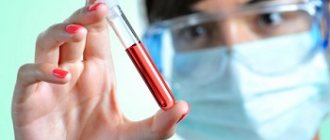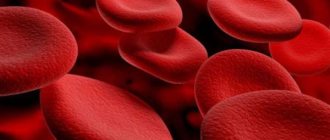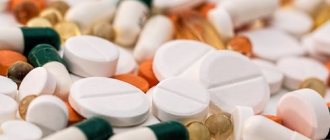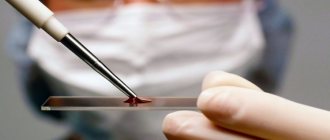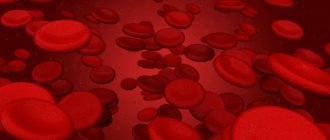Why is this indicator so important for a pregnant woman?
The respiratory function of the body is very important for its normal functioning. Hemoglobin is the substance that transports oxygen and carbon dioxide through tissues. While in the mother's womb, the baby also has a need for oxygen, however, the small organism cannot yet perform this function independently. In this case, gas exchange occurs through the placenta with the blood. If there is a deficiency of hemoglobin, the woman and the fetus may develop oxygen deficiency.
In severe cases, oxygen deficiency in a child can provoke asphyxia and fetal death, that is, its death. Due to this danger, it is very important to monitor this indicator in a woman’s blood throughout the entire period of pregnancy. In addition, iron deficiency may also indicate a lack of B vitamins, that is, folic acid. This, in turn, often leads to hormonal imbalance in the mother, which can lead to miscarriage or premature birth.
Hemoglobin during pregnancy: norm and deviations
The period of waiting for a baby is not only joyful moments and a feeling of miracle inside, but, unfortunately, also ailments, which are sometimes impossible to avoid. Well, women are quite ready to endure any trials for the sake of the desired child.
But, nevertheless, you need to know what awaits you. At least in order to be able to cope with it. One of the pressing issues is the level of hemoglobin during pregnancy, which often decreases, but can also increase. There is nothing wrong with this, it’s enough just to be aware of the topic and take appropriate measures in time.
What do we know about hemoglobin
In general, today many people know that hemoglobin is a special type of protein responsible for transporting blood through blood vessels. It is also known that its decrease is called anemia or anemia. During pregnancy, a special test can determine that hemoglobin has dropped, showing the level of red blood cells (erythrocytes), which are the carrier of protein.
Anemia (iron deficiency) in expectant mothers is not uncommon, but it is still worth ignoring the problem, because it can cause a significant blow to the health of the woman and the fetus. Low hemoglobin is especially dangerous in the first trimester, when the baby’s organs are developing. It is extremely rare that protein levels drop late in pregnancy, which can lead to fetal hypoxia.
It is very good if the concentration of red blood cells is in the range of 120-160 grams per 1 liter of blood. This happens in absolutely healthy women. However, the norm for hemoglobin during pregnancy is considered to be at least 110 g/l. But if the volume of red blood cells has dropped even lower, this is called anemia.
There are three degrees of anemia in pregnant women:
- mild degree: hemoglobin not less than 110-90 g/l;
- medium degree: hemoglobin within 90-70 g/l;
- severe: hemoglobin below 70 g/l.
In fairness, it is worth noting that about half of all women during pregnancy have low hemoglobin, and doctors successfully solve this problem. Therefore, the expectant mother is strongly recommended to regularly see a gynecologist and take all the necessary tests on time. Modern pharmaceuticals have learned to cope with almost any level of complexity of the disease, but it is still better to eliminate it in the early stages, avoiding an advanced stage. Don’t forget that your ailments are passed on to your baby, and you don’t want your baby to suffer.
Symptoms of anemia in an expectant mother
Ailments are good for one thing - they allow you to recognize the disease and cure it in time. The symptoms will tell you almost immediately that you have low hemoglobin during pregnancy. You just need to not brush them aside and not attribute everything to the “whims of the baby.” The signs of anemia are quite clear and understandable; any woman can identify them:
- bluishness of the lips, nostrils and mucous membranes - circles under the eyes may stand out sharply on the face;
- nasty “sticky” weakness leading to nausea and “itching” in the ears;
- severe dizziness, darkening in the eyes - “floaters”;
- fainting;
- tachycardia (from 100 beats per minute);
- rapid breathing, feeling of lack of air;
- migraine;
We offer you a service that will help you find out whether your hemoglobin level is normal at your stage of pregnancy.
What is hemoglobin? Its significance for pregnant women
Hemoglobin is a protein containing iron that helps transport oxygen to body tissues. Its normal values depend on the person’s gender, age and condition. For example, if in women the normal level is 120-150 g/l, then during pregnancy it is 110-130 g/l.
During pregnancy, a woman should consume about 16 milligrams of iron per day. This is the dose that will be sufficient for the normal development of the fetus and maintaining the woman’s stable well-being. Usually, by the 2nd trimester, the hemoglobin value decreases slightly - this is the norm. But if the iron level has dropped very much, it will need to be maintained and restored by taking special medications. Which ones? Your gynecologist should help you with this - without his advice, you should not take any medications while expecting a child!
Causes of iron deficiency anemia
While carrying a baby, many changes occur in the body of the expectant mother. This concerns hormonal changes, as well as an increase in the amount of blood. Accordingly, with an increase in the volume of this vital substance, the amount of hemoglobin in it and other useful substances decreases. In addition, the causes of anemia include the following conditions:
- Various pathologies and diseases of internal organs.
- Severe toxicosis at the beginning of pregnancy, accompanied by frequent vomiting.
- A short period of time between subsequent pregnancies.
- Hormonal changes in the body.
- Taking certain medications.
- Nervous overstrain.
- Digestive disorders that interfere with the normal absorption of iron.
Iron deficiency anemia is usually diagnosed in the second trimester. This is due to the maximum increase in the amount of blood at approximately 20 weeks.
The task of doctors is to promptly distinguish physiological from pathological anemia and take all necessary treatment measures.
A little about hemoglobin
Hemoglobin is a complex protein that is an essential component of blood and is responsible for transporting oxygen to all structures of the body. The carriers of hemoglobin are erythrocyte blood cells. In accordance with their quantity, they judge how much hemoglobin is contained in the body. This protein is extremely important, since it is necessary for the normal functioning of all organic structures, as well as for the growth and full development of the fetus, so it can be argued that the health and even the life of the baby depends on the hemoglobin level.
Therefore, it is important to monitor the indicators of this protein, so that if deviations occur, the problem can be eliminated in a timely manner and all necessary measures can be taken to increase hemoglobin.
The normal level of the substance in the blood of a pregnant woman
Only a doctor can determine whether hemoglobin in a patient’s blood is normal or elevated. It should be noted that in a non-pregnant woman, the normal level of this substance in the blood should be close to 130-140 grams per liter of blood. After conception occurs, these numbers decrease slightly. In the table you can see the norm of this indicator in different trimesters of pregnancy.
| Gestational age | Amount of hemoglobin in grams per liter of blood |
| First trimester | 130 |
| Second trimester | 120 |
| Third trimester | 112 |
After the baby is born, this indicator gradually begins to normalize. This usually takes from 1 to 6 months. This depends on the individual characteristics of the woman’s body, her diet, lifestyle and the presence of concomitant diseases.
Expert opinion
Ksenia Dunaeva
User experience expert and comment moderator. Higher medical education and more than 5 years of actual practice.
Ask Ksenia
Sometimes, in the early stages of pregnancy, the hemoglobin in the mother’s body, on the contrary, increases, which is associated with the absence of menstruation. This phenomenon is usually observed at the end of the first trimester and is not a pathological condition.
How to increase hemoglobin
It is very important to have a normal hemoglobin level immediately before pregnancy, throughout the entire period, and, of course, after childbirth. It is considered healthy and healthy for a pregnant woman to consume approximately 28 – 30 mg of iron in the recommended diet, including vitamin supplements and various supplements.
Regularly checking your hemoglobin levels is very important to ensure that proper hemoglobin levels remain stable. In case of anemia, as one of the ways to treat low hemoglobin levels, the doctor may prescribe iron supplements and special supplements to bring the level back to normal.
There are special vitamins for pregnant women, the main component of which is iron.
In addition to all recommendations and medications, it is important to adjust your diet rich in iron and vitamin C
Products that increase the overall level of hemoglobin in the blood are rich in iron. These include green leafy vegetables, dried fruits, seafood, lean meats, wholemeal breads and grains. A properly selected diet, including vitamins, ensures that hemoglobin levels remain within normal limits throughout pregnancy and even after it.
To ensure that as much iron is absorbed as possible, it is better to take supplements on an empty stomach with orange juice, but not milk. Coffee, tea, milk interfere with the absorption of iron.
Are there any side effects from taking iron supplements?
High iron content in vitamins and supplements can cause gastrointestinal irritation. This often leads to constipation, which in itself is a problem for many pregnant women. If you already suffer from constipation, increase your fluid intake or try herbal laxative products - plums, dried fruits, peaches.
Heartburn, gastrointestinal discomfort, nausea, vomiting, or, less commonly, diarrhea may occur. In such cases, you can increase your hemoglobin level by adjusting the intake of vitamins at different times of the day to adapt to a more comfortable regimen. For example, if iron irritates the stomach lining, avoid taking the medication before bed. On the other hand, if your only complaint after taking it is nausea, try scheduling a supplement meal just before bed.
Take care of yourself!
Signs of iron deficiency anemia
A deficiency of this substance in a woman carrying a baby or a mother while breastfeeding can manifest itself in a wide variety of symptoms. However, the combination of these symptoms can vary greatly among different patients. Let's consider the most common manifestations of a lack of this substance in the blood:
- Weakness, apathy, fatigue.
- Skin problems, brittle hair and nails.
- Paleness of the skin.
- With severe deficiency, a rapid heartbeat may develop. This indicates oxygen starvation of body tissues, in particular the brain and cardiovascular system.
- Some patients may develop an affinity for certain odors, such as acetone, thinner, or paint.
- Women suffering from hemoglobin deficiency are more prone to early toxicosis.
- With a lack of this substance, immunity decreases. As a result, the expectant mother may suffer from thrush, viral, fungal or bacterial diseases.
- Against the background of toxicosis, a decrease in the sensitivity of various tastes may also appear.
You might be interested in: False bellies to simulate pregnancy
It is important to note that a slight decrease in hemoglobin may be completely asymptomatic.
To identify such hidden negative conditions, constant monitoring of the patient’s blood is carried out throughout the entire period of pregnancy. The analysis should be carried out at least once a month, and in the later stages, once every two weeks.
Consequences of anemia during pregnancy
Sometimes anemia does not show any symptoms. However, some of the symptoms of low hemoglobin may include:
- fatigue and fainting;
- pale lips and skin;
- recurring headaches;
- dizziness and inability to do any work;
- feeling of numbness or coldness in the hands and feet;
- cardiopalmus;
- decreased body temperature;
- mild chest pain;
- shortness of breath (shortness of breath);
- irritability;
- strong thirst and desire to eat (or smell) something very strange (for example, clay, earth, paint, ice);
- tingling in the palms and soles.
Morning sickness, which may be accompanied by vomiting, contributes to the development of anemia in pregnant women. Women with multiple pregnancies, as well as those who experienced certain problems with the menstrual cycle before conception, are also at risk. Those mothers who are malnourished or do not take special supplements enriched with iron as prescribed by the doctor cannot cope with the pathology.
Dietary recommendations
If hemoglobin is low, it can be raised by correcting the pregnant woman’s diet. Iron-rich foods should be present on the table. It is recommended to eat regularly, but in small portions. It is important to follow some simple rules:
- This indicator can be increased with the help of iron-containing products. The daily intake of this substance for an adult is approximately 10 to 15 mg. For a woman expecting a child, this norm increases to 20-25 milligrams.
- It should be understood that there are foods that not only increase iron, but also foods that enhance the bioavailability of this substance in the body. These include B vitamins, omega-3 unsaturated fatty acids, sodium, potassium, zinc, and ascorbic acid. These elements are a kind of conductor for iron, that is, they help its good absorption.
- When digested, complex proteins tend to break down into amino acids. These amino acids, in turn, enter into a biochemical reaction with iron. As a result of this reaction, a specific hemoglobin molecule is created. This is why it is so important to saturate your daily diet with foods containing complex proteins.
Under no circumstances should you self-medicate or take various tablets and medications of other forms to saturate the body with iron. Such a negligent attitude towards your body can provoke the most negative consequences. If a woman really needs to take iron supplements, they should be prescribed exclusively by a specialist.
When creating a diet, it is important to understand that not all foods that increase hemoglobin can be consumed during pregnancy. For example, parsley and turmeric can provoke increased muscle tone, in particular, increase the tone of the uterus, which is undesirable during pregnancy.
Ways to increase
There are many ways to increase hemoglobin levels. The choice of recovery method is determined by the specific situation and the severity of the iron deficiency state. In the case of an initial, mild degree of deficiency, gynecologists recommend raising hemoglobin levels by changing the diet, as well as observing sleep and rest patterns, spending more time on walks. For severe iron deficiency, it is recommended to take medications.
Nutrition
One of the simple but quite effective ways to restore hemoglobin levels is a healthy diet. A pregnant woman's diet must be varied and contain a large amount of vitamins. If laboratory tests have shown the presence of iron deficiency, then you need to include in the menu dishes that will contain a large amount of iron. Meat can boast of iron reserves, especially liver, which contains up to 20 mg of iron per 100 g. Eggs also contain a high level of iron - 7 mg. Moreover, iron is absorbed much better from animal products.
Some plant foods like buckwheat, lentils and peas are also rich in iron. Nuts like almonds and pistachios also contain a lot of iron. Various greens are also rich in iron content - parsley and spinach, dill and dandelion leaves, tomatoes, etc. It is also recommended to eat more green apples, bananas, peaches and pomegranates, black currants or persimmons. But the absorption of iron components from foods of plant origin is more complex and takes longer.
Juices from red vegetables are useful, but in order for them to be fully digested and absorbed, it is recommended to prepare them with pulp. Walnuts, dark chocolate and mushrooms, seafood and caviar are incredibly rich in iron. Pharmacies sell hematogen, which also does an excellent job of increasing hemoglobin. An incredibly healthy mixture of honey with dried fruits and lemon, which is recommended to be eaten on an empty stomach.
So, we learned about foods that increase hemoglobin during pregnancy. But there are other ways to increase iron and hemoglobin levels. Various vitamins promote the absorption of microelements. For example, B12. A similar vitamin substance is present in meat, eggs and dairy products. Daily consumption of citrus fruits, fruits, and berries also helps with the absorption of iron.
There are many folk remedies that also help replenish the content of a substance so important for the mother’s body. These include a decoction of strawberry leaves, a wine-nettle decoction, the use of dried fruits and vegetable juice from carrots, beets and apples. Before each meal, it is recommended to take a spoonful of honey with garlic.
Drugs
With a complex degree of hemoglobin deficiency, pregnant women are prescribed medications, the most popular of which are:
- Ferrum Lek;
- Sorbifer Durules;
- Totema;
- Maltofer.
With moderate iron deficiency anemia, patients are prescribed syrups and capsules containing iron. If the degree of deficiency is severe, then injectable drugs are used, intended for intravenous administration. There are some rules for taking such medications. For example, they should not be eaten with dairy products or taken with tea, as they reduce the therapeutic effect of medications. In addition, to increase efficiency, it is recommended to supplement the intake of iron-containing drugs with ascorbic and folic acid.
Folic acid helps the body absorb iron from medications and food fully. If you like tea, then replace it with green varieties, or it is better to drink pomegranate juice, which also promotes the rapid and complete absorption of iron.
Top foods that quickly increase hemoglobin
To increase iron in the blood, the expectant mother must carefully plan her daily diet. You can raise this indicator at home with the help of such dishes.
Liver
To increase this indicator in the body, a woman is recommended to eat beef liver.
It includes a lot of useful elements, in particular B vitamins, iodine, iron and much more. It is important to note that the maximum amount of benefit can be obtained by eating medium-done liver. You may be interested in: 26th week of pregnancy: fetal development, weight and height
Buckwheat
It has been scientifically proven that many grains negatively affect the absorption of iron in the body. The exception is buckwheat. This product, on the contrary, increases the bioavailability of this substance. It is worth noting that the cereal itself includes iron. Its content per 100 g of cereal is about 7 mg. Many pediatricians recommend introducing this porridge even as an early complementary feeding, instead of semolina porridge, which contains a lot of calcium and thereby reduces the production of hemoglobin in the body.
Meat
If during testing it was discovered that the patient has a fairly low iron level (84-89, 90-96 g/l), she is recommended to eat meats such as pork, beef, and rabbit. The fact is that these species are essential sources of proteins and amino acids. We have already mentioned that they are necessary for the formation of hemoglobin molecules.
Beet
This product will be useful for the expectant mother at any week of pregnancy. Even if the iron content in the blood is not very low (102-105, 109-110 g/l), you can eat this root vegetable simply to saturate the body with vitamins and maintain immunity. Drinking beetroot juice will also be beneficial during pregnancy. It is better to take it diluted - one part juice to two parts water.
Carrot
Reviews from doctors indicate that while carrying a baby, you should eat red carrots to increase hemoglobin. It is this type of root vegetable that contains the maximum amount of beta-carotene and various vitamins. These substances promote good absorption of iron and increase immunity. In addition, carrots help improve the digestion process. Indeed, in the first and second trimester, the expectant mother is often tormented by such disorders as constipation, flatulence, heartburn, and belching. The orange vegetable contains a huge amount of fiber, which has a positive effect on the functioning of the gastrointestinal tract.
Pomegranate
To raise hemoglobin, you should also include pomegranates and pomegranate juice in your list of foods. This fruit will be very useful both in the early stages of pregnancy and at 38-40 weeks. Pomegranate quickly increases iron levels and contains a lot of other useful substances, for example, ascorbic acid, potassium, calcium, magnesium, phosphorus. Pomegranate is also famous for its high content of B vitamins.
Honey
When considering what foods an expectant mother can eat that raise the level of iron in the blood, honey cannot be ignored. What is its use? The fact is that honey contains a lot of useful components that cannot be obtained by eating other foods. In turn, these components have a positive effect on the water-salt balance in the body. And this is the most important condition for normal hemoglobin production.
Honey is a strong allergen. If a woman does not tolerate this bee product well, you should not eat it and risk your health.
Dried fruits
Eating dried fruits has a positive effect on the production of this component. These are fresh fruits that have been naturally dried. In this case, it is recommended to give preference to dried apricots, raisins, and prunes. They contain valuable vitamins from group B, C and E. In addition, the absorption of iron is accelerated due to the huge content of plant fiber in them. This has a positive effect on the functioning of the entire digestive tract.
Quail eggs
If a pregnant woman’s hemoglobin drops and is less than 100-108 g/l, she is also recommended to include quail eggs in her diet.
They contain approximately 8 mg of iron per 100 g of product. This important component is also found in chicken eggs, but, unlike them, quail eggs contain less cholesterol. It is important to note that quail eggs should be eaten fresh or minimally heat-treated. This way they retain more nutrients. You might be interested in: 14th week of pregnancy
Seafood
What to do to maintain normal iron levels in the blood? First of all, you need to include seafood in your daily diet. They contain a huge amount of unsaturated omega-3 fatty acids and B vitamins. This is an excellent way to prevent anemia. In this case, you can give preference to such products as red fish, salmon, tuna, salmon, sea bass, red and black caviar, mussels, oysters. It will also be useful to eat seaweed.
Nuts
Various nuts will be useful for the prevention of iron deficiency anemia. Suitable types include peanuts, hazelnuts, cashews, and walnuts. You should not consume them in too large quantities, because this product has a high calorie content and can cause anemia. 30-40 g of nuts added to the main dish per day is enough.
What is the role of hemoglobin in the body?
Probably everyone knows the fact that blood is the most important fluid in the body. Many books can be written (and indeed have been written) about its properties, purpose and importance in general. But now we will talk specifically about the composition of the blood, and specifically about hemoglobin.
As mentioned above, hemoglobin is a complex protein substance. Hemoglobin is responsible for ensuring that each vessel in our body receives its necessary portion of air (more precisely, oxygen) from the lungs.
But what happens when the level of hemoglobin in the blood increases or decreases? Here's what: blood literally becomes thinner when hemoglobin is low, and thicker when hemoglobin is high. Accordingly, with low hemoglobin, the blood is “faster”, which is why it does not have time to “carry” air into each vessel. And when it’s elevated, the blood, on the contrary, is thicker, and this creates difficulties in penetrating particularly small vessels and hard-to-reach parts of our body.
Accordingly, when the level of hemoglobin decreases/increases, the human body becomes not entirely healthy.
What does a violation of hemoglobin levels lead to?
- A person experiences a “loss of strength” - he becomes drowsy, lethargic and, to one degree or another, feels general weakness throughout the body.
- Accordingly, a person becomes less efficient - he has no desire to do anything, and in general, there is no strength to do usual things. Some people experience absent-mindedness and forgetfulness, which also does not contribute to good performance.
- Even with little exertion, he may experience shortness of breath. Also, a person often feels that his hands (fingers) and feet are cold , he constantly wraps himself up, but even the warmest socks do not help.
- Sometimes there is a desire to eat a product that you would not eat in normal life or to smell something that usually seems disgusting.
- A person with impaired hemoglobin levels may experience frequent dizziness, dry or lax skin , or increased hair loss and brittle nails.
- anemia often due to a lack of iron This is the most common “version” of anemia that can occur during pregnancy.
- Hemoglobin may be low if you have recently donated or simply lost a large amount of blood . A lack of folic acid can also contribute to this condition. Doctors often prescribe it for use if you need to quickly increase hemoglobin during pregnancy.
- Very often , hemoglobin decreases if a person (especially girls) starved himself or went on strict, rigid diets . Therefore, all nutritionists strictly prohibit any drastic diets based on one or two foods, recommending a balanced and proper diet.
Why might a expectant mother’s hemoglobin “fall”?
- A pregnant woman experiences an increase in blood volume , due to which the basic life support processes of the fetus occur. Thus, the blood, roughly speaking, is “diluted”, and the hemoglobin level, which was more or less normal, becomes low. As a rule, the increase in volume occurs in the twentieth and after weeks of pregnancy.
- The child himself , who in the process of development needs a large number of different substances, including iron, “takes” these substances from the mother’s body .
- Accordingly, both processes described above increase if the pregnancy is multiple - twins, triplets, etc.
- If conception occurred within a short time after birth . Thus, the mother’s body did not have time to recover from the previous pregnancy. Therefore, the age difference in children is important not only from a financial point of view - the mother must be full of strength and physically ready for the next child.
- In addition, it is possible that the iron that enters the body is simply not absorbed due to intestinal dysbiosis . In the first months of pregnancy, the well-known toxicosis interferes with the absorption of iron in the body.
- Iron can be “wasted” much faster than usual if mommy experiences an exacerbation of any chronic diseases .
Foods that should be limited
If a woman suffers from iron deficiency anemia during pregnancy, it is important for her to understand that there are foods that not only provide iron, but also foods that make it difficult to absorb this component. It is recommended to avoid the following foods:
- Pasta and other products that are prepared on the basis of wheat flour, without including bran.
- Dairy products, due to the fact that they contain large amounts of calcium.
- Chicken egg whites in large quantities can also negatively affect the absorption of a vital component.
Let us remind you that during pregnancy it is recommended to limit the consumption of greens in large quantities, despite the high iron content in them.
The fact is that types of greens such as parsley, dill or basil can increase the tone of the smooth muscles of the uterus, which can even provoke miscarriage and premature birth.
How to increase hemoglobin during pregnancy
How to level up correctly? Low levels can be easily corrected by adding iron or vitamin supplements to your daily diet. As a rule, this is all that is needed to overcome the consequences of iron deficiency in the expectant mother.
However, in very rare cases, women with anemia may require more thorough correction with the help of iron supplements, synthetic vitamin complexes and medications.
Changing food
Preventing iron deficiency anemia during pregnancy requires small additions to your diet. Doctors recommend that a pregnant woman consume up to 30 mg of iron every day.
Products that increase hemoglobin in the blood:
- red meat and poultry, including heart, kidney, liver;
- chicken eggs;
- green leafy vegetables (such as broccoli, cabbage and spinach);
- nuts, sunflower and pumpkin seeds;
- beans, red beans, lentils and tofu;
- buckwheat, brown rice;
- currants, cranberries, blueberries;
- carrot, beet, pomegranate, tomato juice;
- red and green apples, persimmons, bananas and other fruits.
In addition to foods containing large amounts of iron, it is also necessary to supplement a pregnant woman’s diet with foods high in vitamin C. Ascorbic acid promotes improved absorption of iron, so it is also useful to supplement the diet with citrus fruits, bell peppers, kiwi and other foods rich in vitamin C.
Vitamins
If hemoglobin is low, you can add iron and vitamin B9 supplements to your diet in addition to prenatal vitamins. During pregnancy, the doctor leading the pregnancy usually prescribes vitamin complexes intended for expectant mothers. They usually contain sufficient amounts of iron and other nutrients that restore the level of iron-containing compounds in the blood.
Medication method
In rare cases, when the lack of hemoglobin is severe and already poses a danger to the health of the mother and child, various tablets are prescribed, which are selected exclusively by the doctor:
- Actiferrin.
- Hemopher.
- Ferroplex.
- Maltofer.
- Sorbifer Durulex.
Folk remedies
Effective folk remedies for increasing hemoglobin levels are based on the use of various decoctions, tinctures, herbal teas, dried fruits and honey.
Most popular herbs:
- nettle;
- dandelion;
- yarrow;
- rose hip;
- Red clover.
Various decoctions and herbal teas are prepared on their basis. The general preparation technology is to brew dry raw materials with boiling water in a ratio of 1:5 and infuse for 30-60 minutes. The listed herbs contain terpenes, flavonoids and tannins, which have a beneficial effect on the functioning of the hematopoietic organs and help increase the volume of red blood cells.
In addition to herbs, mixtures based on honey, dried apricots, prunes, dates, raisins, nuts and citrus fruits are good for raising the level. Based on these products, a mixture is prepared, for which the solid components are ground in a meat grinder or blender. The resulting product is taken 1 tsp. 3 times a day.
Is it possible to raise hemoglobin using folk remedies?
While carrying a baby, it is better not to experiment with your health. This threatens with some dangerous consequences, which may even be incompatible with the life of the fetus. If you nevertheless decide to use any folk remedies, preference should be given to such safe products as, for example, Ivan tea. This drink contains as much as 23 grams of iron per 100 g of product and perfectly strengthens the immune system.
Any traditional recipes should be discussed with your doctor before use. This will help prevent negative consequences for mother and baby.
Why is there a shortage?
Iron protein deficiency occurs for a number of reasons. Conventionally, they can be divided into physiological and pathological. Anemia often develops in women living in regions with poor ecology.
Some scientists classify iron deficiency as a hereditary disease.
In the first trimester
In the first trimester of pregnancy, anemia most often develops for physiological reasons. These include some individual characteristics of the female body.
Predisposing factors are considered:
- systematic overwork, lack of rest at night;
- lack of an adequate immune response of the body to diseases of viral, bacterial and infectious etiology;
- deficiency of B vitamins;
- non-compliance with nutritional rules;
- disorders of digestive processes;
- prolonged exposure to a stressful situation;
- the presence of diseases that can provoke bleeding;
- low blood pressure.
Iron deficiency in the body of a pregnant woman also occurs during fasting.
In the second trimester
Iron protein deficiency is diagnosed in more than 40% of pregnant women. Most often it occurs in the second trimester.
The reasons for the development include:
- diseases of the digestive tract (including inflammatory lesions);
- hidden internal bleeding;
- abuse of foods containing large amounts of calcium;
- deficiency of animal protein;
- iron deficiency;
- poor diet.
Calcium, which enters a woman’s body in large quantities with food, inhibits the absorption of iron, which provokes a decrease in hemoglobin levels.
In the third trimester
In the third trimester, the risk of developing anemia is quite high. The disease can be caused by serious illnesses. Women suffering from gestosis or hypotension are at risk. Deficiency of iron-containing protein is a common occurrence with placenta previa or placental abruption.
The main causes of the pathology:
- congenital iron deficiency;
- disruption of red blood cell synthesis;
- atrophic and inflammatory processes in the small intestine;
- diseases of the pancreas and liver;
- iron deficiency during multiple pregnancy;
- anorexia;
- thrombocytopathy, thrombocytopenic purpura;
- ulcerative lesions of the gastrointestinal tract;
- polypous or erosive gastritis;
- endometriosis.
Spontaneous miscarriages or abortions (in history) can lead to depletion of iron reserves in the female body.
Why is low hemoglobin dangerous and how does it affect the child?
In the first weeks of pregnancy, namely in the first trimester, such an important process as the formation of the placenta occurs. If a woman suffers from anemia, this process may go wrong. In this case, its underdevelopment or fastening may occur too low. The danger of such a violation is miscarriage, bleeding or oxygen starvation of the baby. Another dangerous complication is hypotension, that is, excessive relaxation of the muscles of the reproductive organ. This, in turn, can subsequently provoke weak labor. In addition, a child whose mother suffered from anemia during pregnancy may have serious health problems. This applies to too low weight, physical and mental underdevelopment due to oxygen starvation. If hemoglobin is low, it is important to start treatment for this disease in a timely manner.
Monitoring the level of iron in a woman’s blood is carried out by taking a general blood test. That is why it is so important to register with the hospital as early as possible.
What if hemoglobin is elevated?
It sometimes happens that pregnant women have elevated hemoglobin levels. It is not at all necessary that this sign indicates alarming deviations. This is normal for the first trimester of pregnancy, but when the baby begins to actively grow and absorb incredible amounts of microelements from the mother’s body, the hemoglobin level will decrease. A sharp and short-term increase in hemoglobin is possible with physical activity.
Sometimes elevated hemoglobin levels can indicate which elements are missing in the pregnant body. Typically these substances are represented by folic acid and vitamin B12. By the way, poor absorption of vitamin B12 is observed in the presence of gastrointestinal pathologies. In addition, an elevated hemoglobin level may indicate the development of cardiac, renal, intestinal and gastric pathologies. Sometimes the reasons for increased hemoglobin lie in the mother’s heredity. This condition is dangerous due to the possible formation of blood clots, which is extremely undesirable for a woman in this position.
Due to high hemoglobin, blood thickens, which cannot circulate normally through the vascular passages. As a result, the fetus does not receive enough oxygen and the necessary nutrition, and persistent hypoxia is formed, which is dangerous for the baby. Therefore, you need to periodically undergo tests for hemoglobin and other microelements in order to timely adjust their intake into the body. Then many problems can be avoided.
What interferes with iron absorption?
- Microelement calcium . Therefore, with low hemoglobin, it is better to eat dairy products in the evening, for dinner. Nature has very wisely decreed here: calcium is better absorbed during sleep, and iron in the morning and during the day - during the maximum activity of the body. What interferes with the absorption of iron?
- Bad habits , including drinking coffee and, especially, strong tea.
- Sedentary lifestyle . During pregnancy, you need to be outdoors as much as possible. Regular walking is very useful.
Symptoms
It depends on the severity of the disease. The mild form occurs without noticeable signs of illness. They begin to manifest themselves when hemoglobin drops below 90 g/l.
- Symptoms of oxygen starvation make themselves felt.
The pregnant woman feels general weakness, tinnitus, and dizziness. Even slight physical activity causes shortness of breath and rapid heartbeat. A feeling of discomfort and pain in the precordial area appears. The skin and mucous membranes become pale. The woman becomes irritable and absent-minded. Memory and appetite deteriorate.
- Tissue iron deficiency is evidenced by food preferences that are somewhat strange for a healthy person. A pregnant woman can eat raw meat, chalk, clay.
The condition of nails and hair worsens. The nail plates thicken and become brittle. Dryness and increased hair loss are observed.
Possible muscle weakness and urinary incontinence. Some pregnant women develop problems with the epithelium (“seizures,” inflammation of the oral mucosa, itching and burning in the vulva area). The nasolabial triangle and palms may turn a little yellow. The sclera takes on a blue tint.
Table showing the amount of iron (in mg) in 100 g of product
| Products low in iron | Foods with moderate iron content | Foods High in Iron | |||
| Product | Fe (mg) | Product | Fe (mg) | Product | Fe (mg) |
| Fresh carrots | 0.8 | "Hercules" | 4.3 | Peanut | 50.0 |
| Pomegranate | 0.7 | Plum | 4.1 | Walnuts | 33.1 |
| Strawberries | 0.7 | Peach | 4.1 | Sesame | 29,2 |
| Milk | 0.7 | Wheat | 3.9 | Beet | 15.0 |
| River fish | 0.7 | Buckwheat | 3.2 | Dates | 13.0 |
| Leafy greens | 0.7 | Lamb meat | 3.1 | Dried plum | 13.0 |
| Lemons | 0.6 | Green beans | 3.3 | Dried peach | 12.0 |
| Kiwi | 0.7 | Raisin | 3.0 | Dry apples | 11.7 |
| Tangerines | 0.4 | Beef meat | 2.8 | Cocoa | 11.7 |
| Homemade cottage cheese | 0.4 | Fresh apricot | 2.6 | Rose hip | 11.0 |
| Goat milk | 0.1 | Apple green | 2.5 | Beef liver | 9.0 |
| Sour cream | 0.1 | Egg | 2.5 | Blueberry | 8.0 |
| Chicken | 1.5 | Pears | 2.3 | By-products | 7.0 |
| Green radish | 1.1 | Fresh plum | 2.1 | Aspic | 6.0 |
| Rice | 1.3 | Currant | 2.1 | Red lentils | 5.0 |
| Potato | 1.2 | Sausages | 1.9 | Yolk | 5.8 |
| Cabbage | 1.2 | Red caviar | 1.8 | Boiled tongue | 5.0 |
Symptoms of low hemoglobin
Hemoglobin deficiency during pregnancy can lead to serious hypoxia, which is manifested by a fairly extensive list of symptoms.
- Excessive fatigue, which may be present even after long periods of sleep. At the same time, patients often note that their limbs are cold, dizziness bothers them, etc.
- When a woman does any physical activity, her body begins to consume more oxygen, which is manifested by the appearance of shortness of breath.
- With the development of iron deficiency anemia, the patient's appearance changes noticeably - her skin acquires pale shades, the mucous membranes turn blue, in fact, it is hemoglobin that provides the blood with such a scarlet-red hue.
- If the hemoglobin deficiency is minor, then he may not have symptoms.
- Many pregnant women note that, against the background of iron deficiency, they often experience flashing midges and ear noise, hair loss and insomnia, and tachycardia. Many mothers, due to anemia, experience a terrible craving for consuming chalk or clay, earth or toothpaste.
Vitamins
Vitamin and mineral complexes help normalize hemoglobin levels in the body of a pregnant woman. The drugs are selected by the attending physician depending on the trimester, age and well-being of the patient.
The composition must contain components that increase the bioavailability of the mineral:
- amino acids;
- copper;
- lemon acid;
- Apple acid;
- ascorbic acid;
- folic acid;
- riboflavin;
- pyridoxine;
- cobalamin
Pregnant women can take vitamins designed for children's bodies. They are completely safe and do not cause side effects.
Popular means:
- Complivit Iron. The dietary supplement is considered a source of vitamins B, PP, C, A, E. It is available in the form of tablets. The drug contains the daily requirement of iron, calcium and other minerals. It has no contraindications, with the exception of hypersensitivity. The course of application is 30 days. You need to drink 1 tablet per day.
- Naturetto Vitamins + Iron. The drug is marketed in the form of tablets that have a pleasant raspberry taste. Contains folic acid, vitamins and daily iron requirement. The dietary supplement is well tolerated by the body. Side effects occur extremely rarely and go away on their own. You need to take 1 tablet per day for 2-3 weeks.
- Pikovit Plus. Chewable tablets do not contain sugar. Main components: zinc, iodine, calcium and iron. The course of application is 30 days. Take 1-2 tablets per day.
- Vitrum Circus. The dietary supplement is marketed in the form of chewable tablets. The composition contains vitamins, folic acid, iron fumarate. The combination drug helps restore hemoglobin levels. Pregnant women should take up to 3 tablets per day. The course of application is 14-20 days.
- Gestalis. The drug was specially developed for the treatment of anemia during pregnancy. Dosage form: capsules. The dietary supplement contains iron, ascorbic acid and B vitamins. You need to take 1 capsule per day for a month.
If a hypersensitivity reaction develops, you should immediately stop taking the drug and consult your doctor. The specialist will select the safest and most effective complex.


